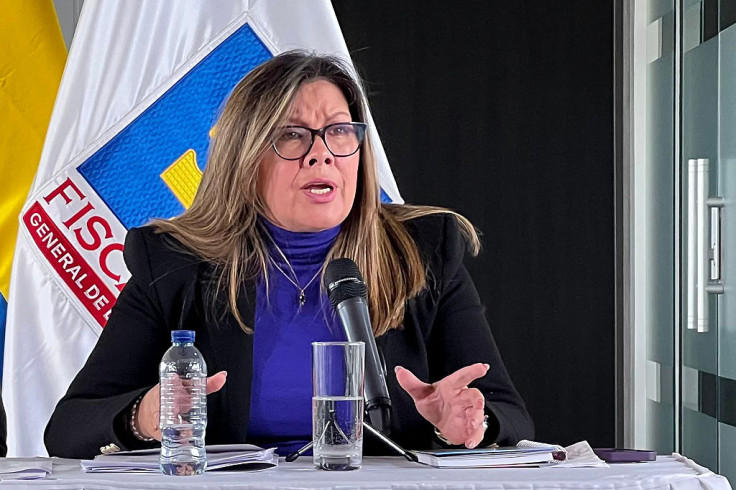
Earlier this month, Guatemala's Public Prosecutor announced arrest warrants for Colombia's Attorney General, Luz Adriana Camargo, and ex-Defense Minister, Iván Velásquez.
The order, accusing the Colombian officials of corruption, was not only condemned by Colombia's government but also by Guatemalan President Bernardo Arévalo. That's because the order is the latest controversial move by Guatemala's judiciary, condemned domestically and internationally for resisting anti-corruption efforts in the Central American nation.
An international anti-corruption effort
Both senior Colombian officials were instrumental in dismantling corrupt networks within the Guatemalan state as part of the United Nations-backed International Commission against Impunity in Guatemala (CICIG).
CICIG was formed in 2006 in response to a Guatemalan government request for assistance in combatting illegal security groups believed to have compromised state institutions.
"For years Guatemala has been governed by illicit networks," Ana María Méndez Dardón, Central America Director at the Washington Office on Latin America (WOLA), told the Latin Times.
Velásquez, currently Colombia's Ambassador to the Holy See, served as CICIG's commissioner from 2013 to 2019, leading investigations into government graft.
"Ivan Velásquez exposed and brought to justice some of the corrupt actors in power during his time at CICIG," said Méndez.
The most famous example was La Línea, or The Line, a customs scandal exposed by CICIG in 2015 in which businesses bribed government officials to evade import taxes. The investigation implicated Guatemalan President Otto Pérez Molina, who was arrested after he resigned following mass protests.
Pérez Molina's successor, anti-establishment candidate Jimmy Morales, became CICIG's next target, investigated for illegal campaign financing.
In response, Morales declared Velásquez persona non grata in 2017 and barred him from re-entering the country in 2018. The president also refused to renew CICIG's mandate, leading to its permanent closure in 2019.
Attorney General Consuelo Porras and the reversal of CICIG's work
In 2018, Morales appointed María Consuelo Porras to be Guatemala's Attorney General. While she initially backed CICIG's investigations into Morales, she later shifted course, becoming a major force in reversing the UN body's anti-corruption efforts.
Since her appointment, Consuelo Porras has faced accusations of democratic backsliding and using the judiciary to intimidate and sanction those involved in CICIG and other anti-corruption efforts.
"The Guatemalan Attorney General has persecuted, in an arbitrary way, without evidence, journalists, judicial operators, [and] members of civil society," Juanita Goebertus Estrada, Americas Division Director at Human Rights Watch, told the Latin Times.
Some 20 prosecutors, judges and magistrates involved in prosecuting corruption cases were forced into exile during the Attorney General's first term.
Her actions have invited international condemnation and sanctions, with Washington adding her in 2021 to its Engel List of anti-democratic individuals and barring her from entering the country.
Amid Guatemala's backslide into institutionalized corruption, a pro-reform candidate began to gain popularity in the run-up to the country's 2024 elections.
Bernardo Arévalo and his Seed Movement party campaigned on promising to break with tradition from the two previous administrations that had sided with, and appointed, Consuelo Porras.
The Attorney General's Public Prosecutor, Rafael Curruchiche, was accused of interfering with the election when he attempted to suspend the Seed Movement just weeks before the run-off election.
But Arévalo, a political underdog, won the elections and took office in 2024. Since then, he has been engaged in a public struggle with the judiciary; the Attorney General has petitioned the country's Supreme Court on at least six occasions to remove the president's immunity and allow criminal investigations against him, according to Human Rights Watch.
New warrants seek "vengeance" against CICIG leaders
Observers view the arrest warrants issued this week against the top Colombian officials, both former CICIG members, as part of Porras' pattern of using the judiciary as a political weapon.
"This is not something new. This doesn't surprise us," said Méndez.
Announcing the warrants, the Public Prosecutor accused Vélasquez and Camargo of influence peddling, obstruction of justice, and collusion during their tenure at CICIG.
Curruchiche said the charges are related to the Odebrecht case, a sweeping corruption scandal in which Brazilian construction giant Odebrecht bribed officials for contracts in 10 Latin American countries.
But Vélasquez and Camargo maintained their innocence in response to the warrants.
"The corrupt Guatemalan Attorney General and her prosecutor Curruchiche – designated as corrupt and sanctioned by the US and the European Union – extend their persecution to me and Luz Adriana Camargo," wrote Velasquez in an X post on Tuesday.
The officials were supported by Colombian President Gustavo Petro, who accused Guatemala's judiciary of being compromised by multinational criminal organizations and narco-traffickers.
President Arévalo also condemned the sanctions and the judiciary.
"These are part of a series of actions by the Public Prosecutor's Office, the Attorney General of the Republic and judges associated with corruption that have distorted the meaning of justice in Guatemala," said the government in a statement on June 2.
For Arévalo, the warrants mark yet another setback in his effort to clean up Guatemalan institutions and improve the country's international credibility.
With Consuelo Porras set to continue as Attorney General until May 2026, the backlash against CICIG and its anti-corruption efforts is likely to continue. But when her term ends, Arévalo will have the chance to appoint a new successor who could reshape the course of justice in Guatemala.
© 2025 Latin Times. All rights reserved. Do not reproduce without permission.




